2017 Asia-Pacific Delegates – Conference Reports
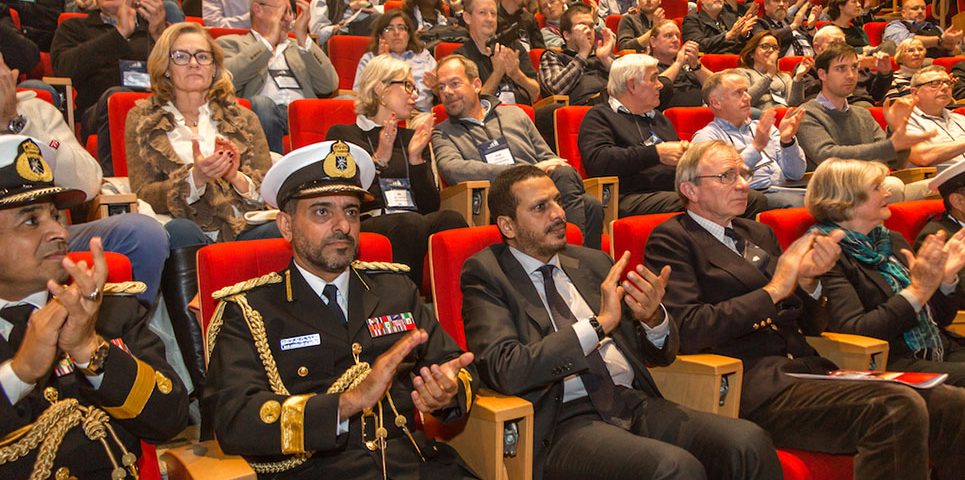
2017 Asia-Pacific Sail Training Delegates – Conference Reports
Each year, Tall Ships Australia and New Zealand facilitates six individual bursaries, funded by Sail Training International, to members to support their attendance at the International Sail Training and Tall Ships Conference.
2017 saw record attendance from Asia-Pacific delegates at the Conference held in Bordeaux, France – including several speakers. Hear from some of the delegates – why they attended, what benefit they gained, and why you should attend in 2018!!
Stuart Bryson – STS Young Endeavour
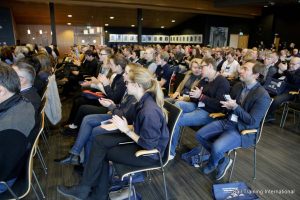 Attending the 2017 STI Tall Ships Conference in Bordeaux was an exceptional privilege. I am relatively new to the world of Sail Training, introduced to the community through my voyage with STS Young Endeavour, and I had little knowledge of the extraordinary community of sail trainers that I met in Bordeaux.
Attending the 2017 STI Tall Ships Conference in Bordeaux was an exceptional privilege. I am relatively new to the world of Sail Training, introduced to the community through my voyage with STS Young Endeavour, and I had little knowledge of the extraordinary community of sail trainers that I met in Bordeaux.
I was particularly inspired by the friends I made among the Youth Council members, a global network representing youth working with or promoting tall ships, each making unique and valuable contributions to their community through sail training programs. I learned that attracting a new generation of sailors is a challenge for most of these programs and took note of innovative approaches to keep both the historic culture of sailing relevant, while offering valuable educational and personal development opportunities.
The Spirit of Oysterhaven project in Ireland struck me as a wonderful example of the social utility of sail training, connecting newly arrived refugees with Irish youth. The program has been celebrated by the UN High Commissioner for Refugees, and the success of the program should encourage other sail trainers to consider both the development of new sailing talent, while also recognising the wider social and civic opportunity to make a contribution to the community. I learned that this multi-purpose approach has been key for many ships securing private and public funding, particularly when companies are increasingly interested in being good corporate citizens. Just as importantly, feedback from youth in numerous countries indicates that young volunteers and paying crew are just as interested in making social contributions as they are developing their own careers and CVs.
Lessons learned
In addition to presenting my own research on the social value of Sail Training programs, I attended sessions on how to integrate education curriculum and non-formal education into our programs, how to make the most of corporate partnerships by adopting a ‘shared value approach’, and how to involve volunteers in a meaningful way. Some of these lessons can be readily adopted. Jon Simpson discussed how the approach to corporate partners can be reframed. Instead of simply seeking one-off injections of financial support from banks, or limited publicity-centric sponsorship opportunities, sail training programs should strategically identify the needs of a corporate partner and offer a program that uniquely addresses that need over a long-term. For example, noting the positive research into the personal development outcomes of participants in sail training programs, operators might be well placed to address a need for alternative approaches to rehabilitation in the juvenile justice system. Offering a long-term, replicable solution to a recurring problem for a government could in turn solve a common problem for sail training operators: financial security. Many programs run benevolently, either as a charitable trust or non-profit model. Such a year-to-year approach to funding limits capacity for long-term planning, especially as ships age and maintenance costs rise, or expansion of a program is desirable.
I have already begun investigating how these lessons can be applied in Canberra. I have had discussions with Canberra magistrates and community justice leaders to establish a referrable option for young offenders and victims of crime to the Australian sail training community. I have had fruitful discussions this year, particularly when I reference some of the research I absorbed in Bordeaux, and I am hearing a keen interest in expanding therapeutic options with other youth development organisations.
 Bordeaux
Bordeaux
The setting for the conference was perfect. Bordeaux is such an intimate city and has made an important historical contribution to French and European culture. Narrow cobblestone streets and a vibrant café and restaurant culture were the perfect catalysts for encouraging networking and instant bonds between participants. It was easy to make great friendships while exploring such a beautiful place. On the final evening, we were treated to an incredible gala wine party in the Palais de la Bourse, which was truly an unforgettable experience. I would have loved another day for free-range networking and discussion out of session, as I was finding much in common with other young sail trainers.
The beauty of the Youth Council is allowing these discussions, proposed projects, and collaboration to continue online. At the very least, the conference was made worthwhile by the support for this future generation of sail trainers. It is difficult to imagine the community remaining active without such strong bonds, and I have been inspired to continue to make my own contributions here in Australia.
I am grateful to Tall Ships Australia and New Zealand and the Young Endeavour Youth Scheme for this amazing opportunity to develop my interest and commitment to sail training programs.
Peter Cole – Sydney Heritage Fleet (Tall Ship James Craig)
This is a report on matters discussed at the Sail Training International Tall Ships Forum which was held in Bordeaux in November 2017, for the benefit of members of Tall Ship Australia and New Zealand.
Firstly, TANZ members should be made aware of the high regard and warmth in which they are held by delegates at the Tall Ship Forum. The Australasian region holds a special place in Sailing Ship history. Without exception, I experienced positive engagement and interest in our current sailing ship activities. This is also evidenced by the generous support by bursaries to assist TANZ members to attend the Tall Ship Forum from the greatest distance!
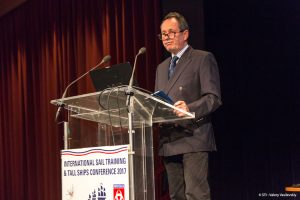
My focus in attending the forum included a desire to meet in person, some of the contributors to the International Sailing Ship Endorsement Scheme (ISES) working group which formed in 2015 and has been running for two years. My own involvement had included many long hours on telephone conference calls formulating policy, training programs and examination content. This program will require commitment to ongoing consultation and engagement. Sadly, not many of the working group were there, which may provide an opportunity of formalising ISES discussion in future forums.
Rig certification was a second area of interest where I hoped to find out how delegates covered traditional Sailing Ship Rig Risk which is unique to our trade. Germanche Lloyd has published guidelines for the maintenance of traditional rigs, which seem to have been acknowledged, without being formally adopted. In summary, it would appear that each sailing ship operator has continued to manage their own risks associated with traditional rigs by performing inspections and applying policies that suit both their ships and the way that they use them.
Safe Operating Stability has also become a subject of interest to the world wide sailing ship community after recent ship losses. Wind Heel Curves, calculated and published in each ship’s stability book, should provide a technical basis upon which to apply empirical observations and formulate prudent operating policies. In discussion, operators appeared to have based their sailing practice on observed ship behaviours, with little or no reference to calculated wind heel curves. Whilst rational and practical, I believe that all TANZ members would be wise to compare the wind heel curves with the observed behaviour of their ships. Disparity may pose a legal risk in the event of an inquiry.
Near Miss Reporting has been introduced and published in the Sail Training International (STI) web site. Sailing Ship Operators have been invited to contribute stories of “Near Misses” they have witnessed, so that others might reflect on their own exposure to similar situations.
A Maintenance Blog was also suggested by delegates, to serve as a knowledge base and reference tool for operators to use in their own maintenance regimes. Examples included unusual combinations of iron and steel in ship hulls, electrolysis in moving parts such as propulsion propellers, advances in rot control and surface coatings. STI staff undertook to develop such a blog.
Commercial Models for Sailing Ship Operation vary according to the special circumstances of each. However, the Jubilee Sailing Trust CEO provided a fine example of working with the Barclays Bank to provide a program of rolling group development events. This has become so successful that Trust Vessels have had trouble providing capacity to service it. This approach is directly applicable to TANZ operators.
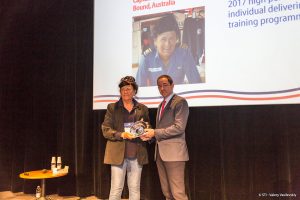
Collaboration in Sailing Ship activity became a significant message that I took away with me. The 2018 Tall Ship Race from Liverpool and Dublin is scheduled to arrive in Bordeaux early in June. This promises to double attendance at the Wine Festival which is to be held at the same time. Despite some commercial negotiation, the combined event promises to be of great mutual benefit to sailing ships and the city.
In closing, special congratulations are due to Sarah Parry’s Windward Bound team for the recognition by award of their Youth Development programs. This was won by a small highly respected operator in the remote Tasmanian region – well done, TANZ members!
Caelli Greenbank – STS Young Endeavour Ambassador
I have been to the last two Australian Wooden Boats Festivals in Hobart as a volunteer crew member on board Enterprize, however this was my very first conference on an international level. My chief interest in attending was to acquire new knowledge to help in the administration and sailing of Enterprize and improve Australian tall ship sailing in general, but I was also very keen to expand my horizons and discover the global sail training community. Prior to arriving, I knew no-one outside of the other Australian attendees and had no idea what to expect from the conference in general, but the website listed an exciting program of seminars to which I was very much looking forward.
Bordeaux served as an excellent host city for the conference, given its inclusion in the STI Tall Ships Regatta in 2018 to coincide with the annual Bordeaux Wine Festival. The Cité Mondiale made a great venue for the seminars, featuring a large dining hall and several small presentation rooms opening off a common foyer on the below-ground level, which was perfect for mingling and talking to other attendees between sessions. I also enjoyed the locations for the ceremonial aspects of the conference, such as the Welcome Reception with the Mayor at the Bordeaux Town Hall, and the Palais de la Bourse was a magnificent and unique setting for the Wine Gala and Closing Dinner.
Part I – The Seminars
A large number of the forums on the program centred around the European Tall Ships Races, offering retrospectives and critiques of the 2017 races and previews of the 2018 events, presented mostly by past host ports for future host ports or by future host ports seeking to attract vessels. These seminars held no relevance and probably only a passing interest for the delegates from Australia and indeed, anyone from the Southern Hemisphere, and other presentations focussing on longer sail training voyages or those held well-offshore were similarly unhelpful for Enterprize and other Australian vessels with limited sail training programs.
I attended six different seminars as well as the Small Ship Forum in the concluding session. These seminars were chosen in conjunction with senior Enterprize crew members based on their relevance to Enterprize and their interest for me personally. All were well-presented and interesting in their subject matter. I particularly enjoyed the diversity of nationalities represented in the speakers and therefore in their maritime and sail training experience, though due to the unexpected absence of one speaker, all those that I heard from were male. The first three seminars all dealt with a single logistical element of tall ship sailing, making their content directly applicable to Enterprize or easily adapted for the ship’s purposes, and I will be making particular recommendations to senior staff from the seminar on crew management. The latter three seminars were chiefly for my own interest, dealing with aspects of sail training and tall ship sailing that rarely come up for Enterprize and Australian tall ship sailing, but which feature into the tall ship scene both in Europe and globally and were useful to learn about as a result.
The attendees at the Small Ships Forum appeared to be prior acquaintances from previous tall ship events for whom the Forum presented an opportunity to gather and discuss issues that may not affect larger ships (such as the necessity for the provision of onshore crew facilities at races and regattas) and which had absolutely no relevance for me as an unknown member of a non-participant vessel.
In my feedback regarding the conference, I expressed a desire that the 2018 conference include more material relevant to volunteer crews, tall ships whose primary function is not sail training, and tall ships outside of Europe and the Tall Ships Races, to help include more vessels and regions in the conference’s purview. Overall I felt the seminars I attended furnished me with some useful information and ideas that can be applied or adapted for use with Enterprize and other Australian ships, but mostly served to provide a global context for the sail training and tall ship community.
Part II – The People
A key component of the conference for me was networking and the chance to meet other tall ship sailors from around the world. I went to France with a list of ships with which I wanted to make connections, both for my own interest and for the benefit of Enterprize. I had the chance to meet many of these crews and masters over the two days of the conference and win some new friends and possibly partners for Enterprize.
During the conference I also learned of the existence of the STI Youth Council and had a chance to learn a little about its function. I made the acquaintance of a number of members from Europe, the Americas and Africa over coffee and lunch breaks and sat with several of them during common seminars. I also joined in the social activities organised for council members on the second night of the conference as well as at the closing gala dinner, which was a great opportunity to consolidate some of the friendships I’d made in Bordeaux. It was wonderful to spend time with like-minded young people who share my passion for tall ship sailing and make connections that could help myself, Enterprize and the Australian tall ship community in the future.
In a sense, the conference also served as an impromptu gathering for the Australian tall ships, bridging the usually insurmountable distance between the east- and west-coast vessels. For me, it was a rare chance to meet the captains and senior staff of all the major ships in Australia, notably that of the Leeuwin II which I’ve never encountered at any tall ships events in the past. The presence of multiple young Australian sailors and sail trainers also presented a unique opportunity to discuss the youth sailing scene in Australia, as a result of which discussions are now underway regarding the establishment of an Australian & New Zealand Youth Council, to represent and unite the youth of the Australian & New Zealand sail training community.
Conclusion
Due to the Europe-centric nature of the majority of the seminars and consequently the attendance list, the content of the conference in general wasn’t as intrinsically inclusive or directly relevant as I would have hoped. The seminars I attended were fascinating nonetheless, even when not applicable to sail training in Australia, and the calibre of presenters was excellent. The networking and socialising sides of the conference were amazing as well, both personally and professionally. I thoroughly enjoyed the whole experience and am very much hopeful of returning in 2018.
Carol Shannon – Leeuwin Ocean Adventure Foundation
Firstly, may I say how appreciative I was of receiving the bursary to attend the Operators Meeting and Bordeaux Conference in November/December 2017. As a self-funded attendee, the generous contribution certainly makes a difference.
Attending the conference for the first time, I was unsure how best to optimise my benefit from the conference agenda, given the diversity of discussion themes. On reflection, I believe I chose well, focusing on key two themes – community and corporate partnerships and ship maintenance and renewal.
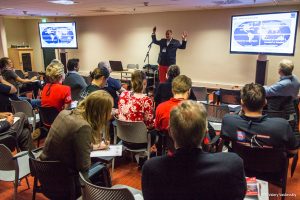
Sessions 1C (Creating meaningful partnerships – Duncan Souster) and 6C (Shared value – a way of building long term corporate partnerships) were particularly interesting and sessions 4C (Rehabilitation or a new ship) and 5B (The designing, building and commissioning of world class tall ships) provided broader insight into some of the issues that, as tall ship operators, we all share.
I think one of the most startling learnings for me was the realisation of the very different operating environment we have in Australia. Our isolation, possibly even more relevant as the only sail training organisation on the west coast, in comparison to ships in Europe, who work in company to participate in tall ship races and events in close association with ports and coastal communities and cities. While I was aware of these events, the enthusiasm of ports to participate in tall-ship events and the strategies used to attract these events to different ports throughout Europe was intriguing. The opportunities this approach provides to the recruitment of trainees is in such stark contrast to the issues we deal with in Australia – the tyranny of distance and population-free coast lines.
Nonetheless, there are as many challenges that we share as there are differences in our operations and the networking opportunities were frequent and I took up as many opportunities as possible to speak to different people from different ships/organisations and countries.
Attendance at the Operators’ Meeting prior to the Conference was also of value and I took the opportunity to join the Blue Flag Scheme working group. We have been in contact since returning from the Conference, with the key discussion points to date being a tagline and rubbish recycling and disposal facilities at ports. This is clearly a problem shared globally.
Overall, I think it was a valuable use of time and resources and again, thank you for the opportunity to access a bursary.
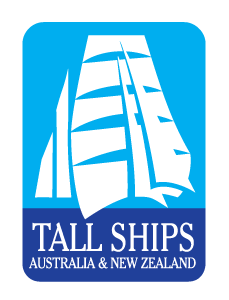
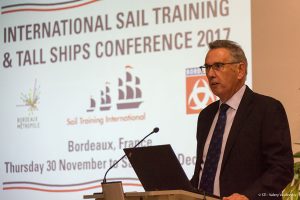
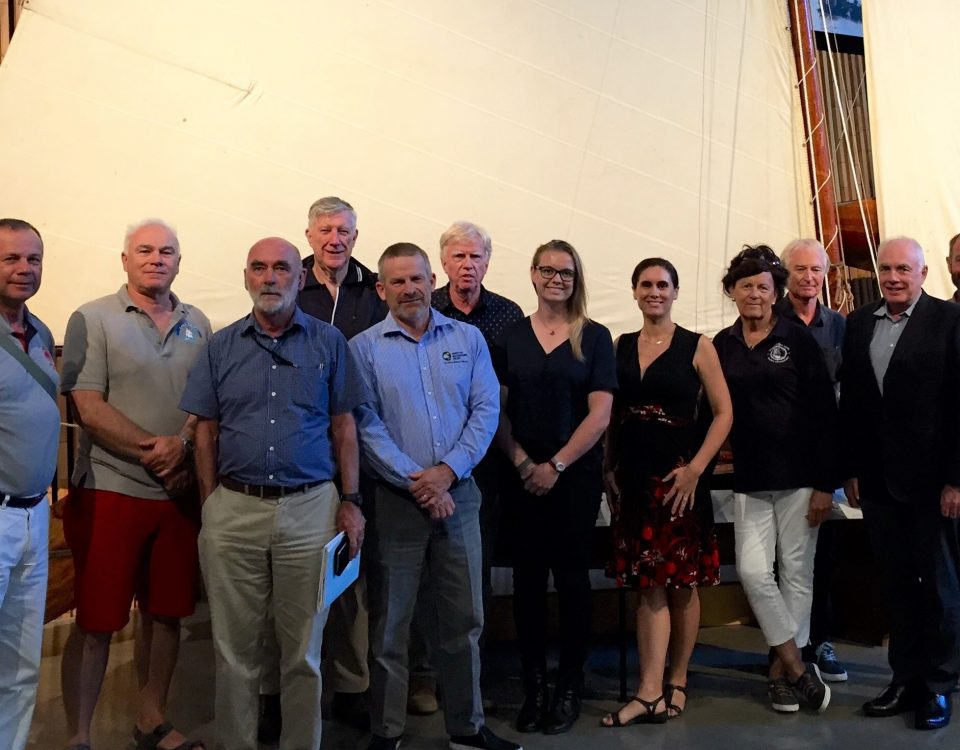
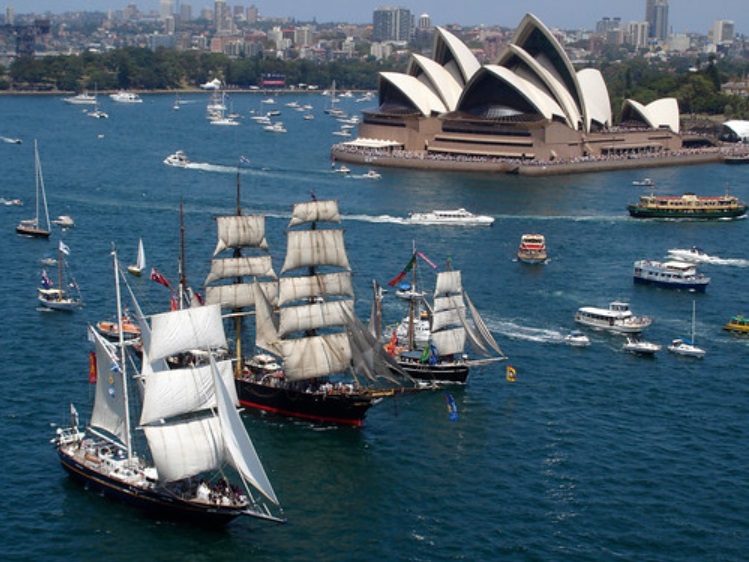
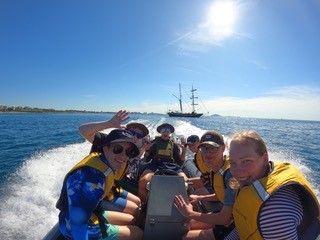
2 Comments
It was great to read the reports from the TANZ members who attended our International Sail Training and Tall Ships Conference in Bordeaux last year and to learn how much they valued being there networking with the international sail training community.
It has always been a pleasure to receive delegates from TANZ/AUSTA at our conferences and we are grateful for the inspirational presentations that they made in Bordeaux. Thank you for the continued support and we look forward to seeing TANZ delegates again in Seville later this year.
Many thanks Paul. A pleasure for us also!